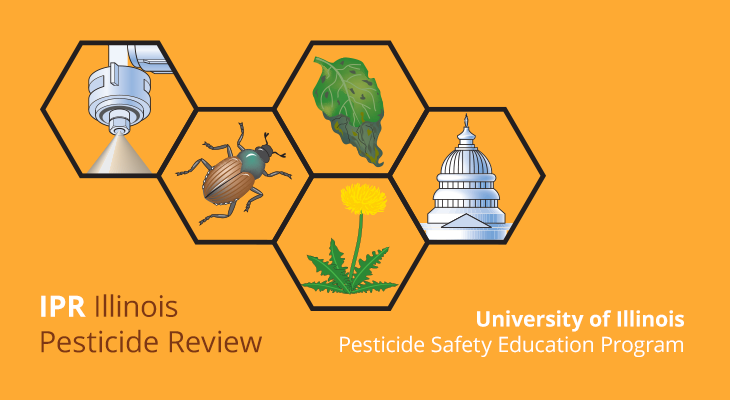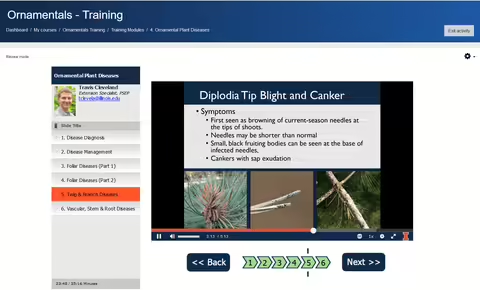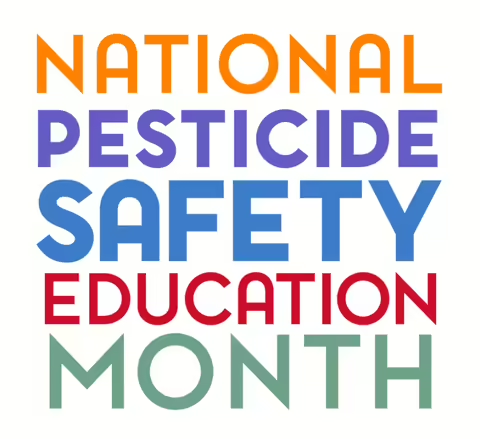
New Turfgrass and Ornamentals Online Category Training Courses Available
Illinois PSEP recently launched two online courses designed to prepare Illinois pesticide applicators for the turfgrass and ornamentals category exams. Each course is divided into sections covering Integrated Pest Management, Weed Pests, Insect Pests, Plant Diseases, and Application Equipment and Calibration. Content is delivered in short videos and immediately followed with knowledge check questions. While entirely optional, these questions will help you to determine your exam readiness and any concepts or topics you may want to reinforce in your exam preparation. Each course provides a linear flow of content that builds upon itself. However, you are free to navigate the course in any order you wish. Your progress will be automatically saved so that you can quickly pick up where you left off. Access to each course is available for a 30-day window upon purchase ($25 per course). You may review the course content as many times as you would like during your 30-day access window.
The online ornamentals training course will take approximately two hours to complete. International Society of Arboriculture (ISA) has approved this course for the following CEUs: Certified Arborist = 2, Utility Specialist = 1, BCMA Science = 0.75, BCMA Practice = 1.25.
The online turfgrass training course will take approximately two and a half hours to complete. Golf Course Superintendents Association of America (GCSAA) has approved this training for 0.35 points toward entry/renewal of Class A Membership and Certified Golf Course Superintendent (CGCS).
To register or view a list of the additional training courses, please visit Illinois PSEP’s Training & Testing web page.
What to Expect When Taking Your Illinois Pesticide Certification Exam Online
Do you ever have the feeling that someone is watching you? Well, your intuitions may be correct, especially if you happen to be taking a pesticide certification exam. This should not come as too big of a surprise; Illinois Department of Agriculture (IDA) staff have always closely monitored individuals taking their pesticide certification exams. We are accustomed to taking those exams at in-person training and testing clinics. IDA recently introduced an online testing option to meet the anticipated certification needs. Online examinees are still monitored throughout the exam, albeit by a remote proctoring service.
A remote proctoring service monitors test takers from a separate location. These services are designed to provide a similar experience and level of security to that of an in-person testing session. During an exam, a proctor will have access to your webcam, microphone, and computer activity. This access is used to verify your identity and to track any unusual behavior such as looking off-screen, accessing unpermitted materials, speaking aloud, or allowing other people in the room. Many services also utilize artificial intelligence to help proctors identify small lighting or sound adjustments and unique behavioral patterns that may warrant further inspection.
While intrusive, remote proctoring is an essential component of offering online pesticide certification exams. Remote proctors ensure exams are secure, credible, and meet state and federal regulations (see 40 CFR 171.103). The proctor can access your computer only during the exam session, and all of their activity can be seen by test-takers in real-time, meaning they cannot perform any action without your knowledge.
IDA and numerous other academic and professional institutions utilize ProctorU to monitor their online exams. If you would like a better idea of what to expect from ProctorU, they have a video available that outlines the remote proctoring process and how to prepare for exam day. When you are ready to take your exam, begin the testing registration process at the Illinois PSEP Training and Testing Webpage.
IDA continues to offer an in-person testing option for individuals with privacy concerns, limited computer access, and those who strongly prefer traditional pencil and paper exams. In-person testing options remain limited due to the state’s COVID restrictions. Visit the IDA In-Person Testing Page to view locations and register for a session. IDA will continue to add new testing locations as they come available.
New WPS Safety Posters Now Available
US EPA has made available on their Worker Protection Standard (WPS) materials website newly updated posters (and brochures) that can assist agriculture employers with WPS compliance as the posters convey required pesticide safety messages. These posters are available as FREE downloads for printing and are offered in several different sizes as well as 8 different languages including English, Spanish, Chinese, Haitian-Creole, Ilocano, Karen, Russian, Tagalog and Vietnamese.
The “Protect Yourself from Pesticides” posters are ideal for posting at central locations
and decontamination sites.
Additionally, alternative WPS posters and a vast collection of WPS resources including training materials, videos, handouts, and flipcharts are available at the Pesticide Educational Resources Collaborative website.
Adapted from an EPA email received on 10/6/20
IDOA Announces Dicamba Decision for 2021 Growing Season
The Illinois Department of Agriculture (IDOA) has registered the following Dicamba products for the use on soybeans for the 2021 growing season: XtendiMax with Vapor Grip Technology, Engenia Herbicide, and Tavium Plus Vapor Grip Technology. The new federal label for dicamba was issued by the United States Environmental Protection Agency (USEPA) on October 27, 2020.
The new federal label requirements for these products include:
- Requiring an approved pH-buffering agent, also known as a volatility reducing agent, be tank mixed with dicamba products prior to all applications.
- Requiring a downwind buffer of 240 feet and 310 feet in areas where listed endangered species are located.
- Additional recordkeeping items.
The approved federal label also includes a cutoff date of June 30 for application of these products on soybeans. However, IDOA will be utilizing its authority pursuant to Section 24(a) of FIFRA and relevant provisions of the Illinois Pesticide Act to impose a cutoff date of June 20 for application on soybeans. In addition to the June 20 cutoff date, IDOA also intends to include the following additional application restrictions for application of these products on soybeans:
- Temperature restriction of 85 degrees Fahrenheit.
- Requirement to consult the Field Watch sensitive crop registry.
- Prohibiting application if the wind is blowing toward any Illinois Nature Preserves Commission site that is adjacent to the proposed field of application.
- Prohibiting application when the wind is blowing toward an adjacent residential area.
“This decision was made after evaluating several factors, including the reduction of pesticide misuse cases involving the use of dicamba on soybeans from 2019 to 2020,” said Acting Director Jerry Costello II. “In 2020, the Department included an 85 degree temperature restriction in addition to the June 20 cutoff date, resulting in an 80% decrease in dicamba misuse complaints.”
Dicamba is a herbicide commonly used on soybeans and cotton. Illinois ranks first in the nation for soybean production producing 532 billion bushels of soybeans per year. The July 30 cutoff date for application of these products on cotton will not be affected.
Source: Illinois Department of Agriculture Press Release, Springfield, IL
New Requirements for Applying Dicamba on Soybeans in 2021
By Maria Turner
The Pesticide Safety Education Team has once again updated the reference guide for applicators who will use Dicamba on soybeans. Knowing that planting is approaching quickly this year, it is crucial to now become familiar with the requirements before it is time to spray and you find yourself in a time crunch. Read the label closely and follow the additional state restrictions.
How Much Do Homeowners Know About IPM (Integrated Pest Management)?
You read the title and I bet you have your opinion, right or wrong. Over the years, I have heard various concerns expressed about pest control and pesticide use. Certainly, many fingers are pointed at commercial applicators due to the sheer number of applications and acres they treat but in fact, fingers often point toward homeowners with the claim that they simply don’t read and follow product labels or they don’t know what they are doing. “Spray and pray” is the term used.
Truly, commercial applicators must demonstrate to the public that they are knowledgeable in using pesticides safely and effectively. They do this by passing competency exams and obtaining licensure, but what about homeowners? They can legally buy and apply general use pesticides on land they own without testing and licensure. They are however, legally bound to read and follow all label directions.
What about knowledge of IPM and pest control in general for homeowners? These are topics covered in pesticide applicator trainings and study materials, but unless one does this for a living or has a profound interest in the topic, reason stands that this knowledge could be somewhat limited.
Since COVID-19 hit, many homeowners have found a renewed interest in maintaining their lawns and landscapes themselves rather than hire a service. The number of gardens planted this year was much higher than in previous years. In fact, according to Garden Media Group (GMG), we picked up 16 million new gardeners during the pandemic, many of whom are under age 35. A new wave of “Victory Gardening” was spurred by the increase in home cooking. GMG reports too that 67% of adults are growing or plan to grow edible plants. Seeds and canning lids were in short supply this summer. Growing plants involves protecting those plants from damage causing pests and competing weeds. This brings us back to IPM. How knowledgeable are those who are making pest control decisions? Are pesticides being used indiscriminately without consideration to environment and other pest reducing gardening practices?
With this in mind, a recent study by researchers at the University of Florida was conducted and published in the open-access Journal of Integrated Pest Management. According to the researchers, this study “comprised part of a large multi-year national study of residential landscape management perceptions and practices”. Participants were U.S. citizens age 18 or older who were responsible for decisions about managing their home lawn and landscape. They were carefully screened and surveyed. The study collected information on a self reported assessment of IPM knowledge and IPM engagement. The study’s findings are interesting with a wide range of knowledge determined within the 2,100 plus population surveyed.
The publication provides discussion and possible explanations as to why IPM adoption is low. It mentions that residential consumers account for more user expenditures of insecticides than several other users (including agriculture and commercial) combined so a focus on this particular audience is relevant. It also discusses how Extension is perfectly suited for the role of IPM education as past IPM training efforts by Extension for farmers have been successful and that applying those same methods to homeowners would be logical. For more information about how the study was conducted, details of the survey questions, and full results, please consult the full journal article.
In a recent post by Entomology Today, David Coyle summarized some of the study’s key findings: Most respondents were at least “Fairly knowledgeable” about landscape integrated pest management practices, but between 21 and 26 percent had “Almost no knowledge” of these practices;
Over 55 percent of respondents “Always” or “Most of the time” managed pests in their yard with as few chemicals as possible;
Nearly 25 percent of respondents “Always” or “Most of the time” treat their entire yard with pesticides without identifying pests.
These findings demonstrate that a majority of homeowners report an acceptable awareness and application of IPM best practices, which is fantastic! However, there also exists a need for more homeowner IPM educational resources, which would hopefully reduce the number of people with “almost no knowledge” of IPM practices. The researchers indicated that increased knowledge of IPM is correlated with increased engagement in IPM practices. Overall, Extension has work to do and as long as there are new homeowners and new interests in gardening or landscaping, there will always be work to do. This includes describing best practices using pesticides but also teaching homeowners how to scout and identify pests and beneficial insects.
University of Illinois Extension offers various pest control resources including handbooks, pest cards, blogs, webinars, and videos for homeowners. Their Horticulture YouTube channel has many IPM resources including the What’s in My Backyard Series which is aimed at educating homeowners about tree and weed identification and tree pests of concern. The Good Growing in Illinois Podcast has many IPM related topics such as this one about Good Bugs in the Garden. Numerous horticulture blogs are available but a list of those tagged as containing IPM information can be found at this link. Also, the Master Gardener program is excellent for those who truly want to learn even more about all aspects of gardening. Finally, the Pesticide Safety Education Program’s online training modules are a new resource that anyone interested in learning more about pest control and pesticide safety could benefit from.
Sources:
Residential Pest Management: What Do Homeowners
Know, and What Do They Do?
What Do They Know and What Do They DO? A
National Evaluation of Landscape Integrated Pest
Management Knowledge and Use in the United
States
Garden Media’s 2021 Garden Trends Report: The
Great Reset
National Pesticide Safety Education Month
The Fourth Annual National Pesticide Safety Education Month – February 2021
The purpose of National Pesticide Safety Education Month is to reinforce core principles of safe pesticide use with many audiences and raise awareness of and support for the landgrant university Pesticide Safety Education Programs (PSEPs).
The National Pesticide Safety Education Month webpage contains a quiz to check your knowledge of some basic pesticide safety principles and a self-assessment to review some of your own pesticide safety practices at home and at work. You can also view a sample of educational resources produced by landgrant university Pesticide Safety Education Programs and learn the importance of these programs.
Download This Issue of the Newsletter
Download, save, and share the 2021 January / February issue of the newsletter.
Editorial Notes
The development and publication of this newsletter has been supported with funding from the Illinois Department of Agriculture.
Michelle Wiesbrook, Extension Specialist, Pesticide Safety Education
The Illinois Pesticide Review is published six times a year. For more information about pesticide safety or for more issues of this newsletter, please visit us at www.pesticidesafety.illinois.edu. You can also reach us at 800-644-2123.
Disclaimer: Mention of trade names in this newsletter is for general information purposes only and does not constitute endorsement of one product over another, nor is discrimination intended against any product.
Copyright © 2021, Board of Trustees, University of Illinois
Find Us On Social Media
We’re on Facebook! Follow our University of Illinois Extension Pesticide Safety Education (PSEP) page for updates on programs, news, and events.

